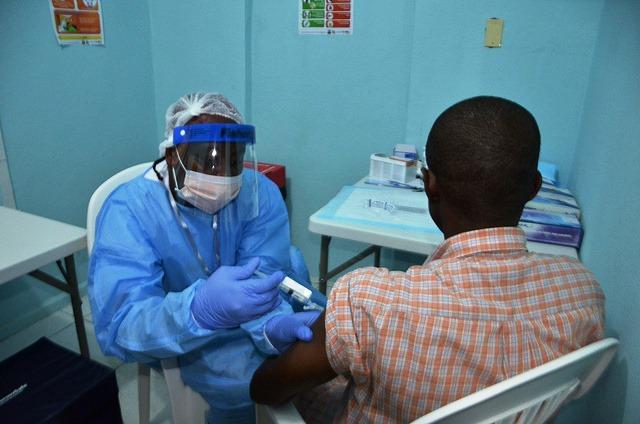Although the World Health Organization (WHO) this week ended the global health emergency over Ebola, the world cannot ease up on efforts to maximize development of Ebola vaccines and prepare for the next outbreak, according to an expert panel.
A report today by the Ebola Vaccine Team B comes a little over a year after its first report, which detailed desirable qualities to seek in as-yet undeveloped vaccines and included a host of recommendations for quickly responding to the then-accelerating crisis.
Since that time a vaccine produced by Merck has demonstrated impressive efficacy in clinical trials, and other vaccines have advanced well along the clinical trial pathway. But no vaccine has yet been approved by the US Food and Drug Administration or other regulatory body, the experts point out in their report, and public health officials must not grow complacent until one or more vaccines are advanced enough to stockpile and respond to the next Ebola epidemic.
Team B was rapidly assembled in November 2014 by the Wellcome Trust and the Center for Infectious Disease Research and Policy (CIDRAP) at the University of Minnesota as the Ebola outbreak heated up in West Africa. The team has convened periodically to discuss vaccine developments and map out strategy. CIDRAP is the publisher of CIDRAP News, but its research and policy efforts operate independently from its news operations.
The expert committee is called "Team B" in recognition of the principal role played by the WHO and national governments in leading the international Ebola response. Team B's aim is to support other public health efforts.
Trials of one vaccine—Merck's rVSV-ZEBOV—progressed far enough by last July to demonstrate that it was safe and effective in people in West Africa. Its success recently prompted Gavi, the vaccine alliance, to buy 300,000 doses to stockpile for use during future Ebola outbreaks. Other vaccines, notably those made by Johnson & Johnson and GlaxoSmithKline, have advanced well into clinical trials.
Focus areas
The new report, "Plotting the Course of Ebola Vaccines: Challenges and Unanswered Questions," focuses on four areas: (1) vaccine safety and efficacy, (2) regulatory pathways for Ebola vaccines, (3) input from African experts, and (4) the business case for ongoing Ebola vaccine development and deployment.
"We identify four key areas in which critical additional work and effort are needed to enhance Ebola preparedness for future outbreaks, particularly in the megacities of equatorial Africa, and to address the ongoing concern that Ebola virus disease may become endemic in West Africa," said CIDRAP Director Michael Osterholm, PhD, MPH.
"If West Africa was a gas can waiting for the Ebola match to strike, megacities in equatorial Africa are the gas tankers waiting for an Ebola spark," Osterholm added. "We simply cannot let this opportunity to prepare for the next outbreak pass us by."
Guarding against complacency
Wellcome Trust Director Jeremy Farrar, MD, PhD, said, "Although a global collaborative effort has moved us from having no drugs or vaccines in the early days of the Ebola epidemic to now having a safe, effective vaccine and other promising candidates, it has taken too long, and the job is still not done."
"As Ebola infection rates come under control it's a huge concern that complacency sets in, attention moves to more immediate threats, and Ebola vaccine development is left half-finished," he added.
"Today we're calling for a renewed commitment from the global health community. After the hard lessons we've learned, it would be a tragedy not to put a final stop to the current Ebola epidemic and be prepared for the next outbreak."
Osterholm said, "While many in the international public health community believe these efforts have solved the problem of Ebola, the path forward is not quite so simple, and many unresolved challenges and questions remain."
Osterholm added that the WHO's Mar 29 declaration of ending its global public health emergency over Ebola should be a cause for celebration, but it could be interpreted by some as a reason for complacency.
"It's just one more indication that the urgency for developing and securing effective, safe Ebola vaccines is waning. That lack of urgency today could easily translate into an inability to respond effectively to the next outbreak we see in Africa."
More studies encouraged
In contrast to the 48 recommendations that the group proposed in its first report in February 2015, today's report offers just 8. The first is to renew the commitment to developing one or more effective vaccines, which is a theme repeated throughout the 33-page document.
Others include completing clinical trials for as many vaccines as is feasible, continuing animal studies, spelling out what is needed for regulatory approval, gearing up for what studies to conduct during the next outbreak, strengthening engagement with local public health officials in Africa, and developing financial road maps.
"Our vision is that collaboratively we can address these issues and ensure that Africa never again is confronted with an Ebola outbreak as devastating as the one we witnessed during these past 2 years," Farrar and Osterholm wrote in the report's foreword.
See also:
Wellcome Trust–CIDRAP report landing page
Feb 17, 2015, CIDRAP News story "Report: Long-term Ebola threat makes vaccines essential"

















